Monday, December 30, 2013
In 2013, Earth Policy Institute's researchers investigated a broad range of topics. For instance, over the 4th of July weekend the Guardian/Observer published “Peak Water: What Happens When the Wells Go Dry?” by Lester Brown. The editor accompanied this with his own article based on a conversation he’d had with Lester. It was entitled “Global threat to food supply as water wells dry up, warns top environment expert.”
The op-ed caught the attention of news organizations including Yahoo! News, the Hindu, the Free Republic, Shanghai News, and the Albuquerque Express. Meanwhile, the Institute released Lester’s piece as a Plan B Update to its public and media lists and sent targeted, personal emails to our list of agriculture reporters. We also mailed it to the state secretaries of agriculture.
This year World Food Day coincided with the official release date of Breaking New Ground. The research team released “10 Things to Know about Food.” The list was posted on major blogs including Treehugger, Grist, and Buzzfeed and was picked up by the Globalist, the Huffington Post, and Globe-net, and was even translated into Persian. It served as a good example of how the Institute’s material can be repackaged for an expanded audience.
Janet Larsen conducted a major research effort on bike-sharing. In one of the first reports of its kind, Janet took a global look at bike-sharing and found that today more than 500 cities in 49 countries host advanced bike-sharing programs, with a combined fleet of over 500,000 bicycles. Bike-sharing has come a long way since 1965, when fifty bicycles were painted white and scattered around Amsterdam for anyone to pick up and use free of charge. The piece was reposted on major blogs including Sustainablog, Grist, Treehugger, and the Permaculture Research Institute of Australia and was also reprinted in the Bicycle Times. Micheline Maynard cited it in her Forbes article “With San Francisco On Board, U.S. Bike Sharing Doubles” and the Economist shared some of the data in its October 12th print and online edition.
In June, Janet and Matt Roney collaborated on an Update titled “Farmed Fish Production Overtakes Beef.” For the first time in modern history, world farmed fish production topped beef production. The gap widened in 2012 with output from fish farming or aquaculture reaching a record 66 million tons, compared with production of beef at 63 million tons. And 2013 may well be the first year that people eat more fish raised on farms than caught in the wild. The piece received major attention in Canada where aquaculture plays a prominent role. It was also reposted on the Huffington Post and cited in a National Geographic blog.
Matt wrote a Data Highlight entitled “Wind Surpasses Nuclear in China.” Indeed, wind has overtaken nuclear as an electricity source in China. In 2012, wind farms generated 2 percent more electricity than nuclear power plants did, a gap that will likely widen dramatically over the next few years as wind surges ahead. This major new development was shared widely on social media and Matt eventually sat down with Mike Walter on China Central Television to discuss the decline of nuclear power.
Emily Adams’ Data Highlight “U.S. Carbon Dioxide Emissions Down 11 Percent Since 2007” revealed that carbon dioxide emissions from burning fossil fuels in the United States peaked in 2007 and have since fallen 11 percent, dropping to over 1.4 billion tons in 2013. The piece was reprinted in the National Journal and Emily was interviewed on the topic for ARD German TV. Emily also had speaking engagements at the Earth 2100 Conference put on by Our Task, the Washington Youth Summit for the Environment at George Mason University, and at the UNICEF International Development Conference at Georgetown University.
Throughout the year, news organizations interviewed researchers on various environmental issues. On the 43rd anniversary of Earth Day in April, Lester was interviewed on NPR’s Talk of the Nation and asked to explain what's changed since the first Earth Day in 1970, as concern about climate change and green energy have come to the forefront of the movement. Lester was also on The Big Picture with Thom Hartmann in October to discuss the release of the IPCC's Fifth Assessment Report, which he said should serve as a wake-up call.
Janet was interviewed for NPR’s food blog The Salt on the world's first in vitro burger. She concluded that it's far simpler to accelerate the reduction we're already seeing in meat consumption in the U.S. than wait for lab-grown beef. Janet was also asked to weigh in on the destruction of the Philippines after Typhoon Haiyan on France 24 News.
Other subjects covered by Data Highlights included China’s rising soybean consumption, falling gasoline use, the U.S bike-share fleet more than doubling in 2013, and China’s growing meat consumption shown by the move to buy Smithfield. The research team also released six Eco-Economy Indicators on solar power, carbon emissions, wind power, ice melt, grain stocks, and global temperature.
The team’s PowerPoint presentations relating to Full Planet, Empty Plates have collectively been viewed online more than 30,000 times. EPI’s PowerPoint presentations and data continue to be some of the most downloaded items from the Institute’s website. (See a listing of all Institute releases.)
Cheers,
Reah Janise Kauffman
Wednesday, December 11, 2013
October and November were whirlwind months for Lester Brown as he was out and about promoting his autobiography, Breaking New Ground.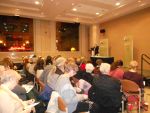
He started out with an event at Houston’s Progressive Forum on Sunday, October 6. Then, after a fun book party in DC, he headed to New York City where he spoke with Maggie Linton, host of Urban View, Sirius XM Radio and gave a luncheon address at the Friar’s Club sponsored by The Common Good. He also spoke at the Conrad Hilton Humanitarian symposium on peak water.
On October 24, Lester shared his life and vision at Rutgers University through a "fireside chat" with Joseph Seneca, Bloustein professor of environmental economics and policy.
He briefly touched down in the office before heading back on the road, this time stopping in Princeton, New Jersey, for an event sponsored by D&R Greenway. Our thanks to EPI board member Scott and Hella McVay for making this possible. Then he moved on to the Boston area where he gave presentations at the Cambridge Forum, Harvard University where he spoke on peak water, a breakfast hosted by the Environmental League of Massachusetts, and the Lexington Global Warming Action Coalition.
An interview with him has already been published in the Harvard Crimson.
At Harvard he had a chance to catch up with E.O. Wilson over lunch—and even tour Wilson’s famous ant collection. Our thanks to former EPI researcher Jignasha Rana for making this possible.
Next was a stop at some of the environmental hubs on the West Coast. First up was Vancouver, where Lester spoke to a rapt audience on the food situation at an event hosted by the Canadian Centre for Policy Alternatives. Salt Spring Island was next, which was accessed by a float plane (see photo). Salt Spring Island is where EPI’s editor, Linda Starke, spends her summers and she helped organize the event at the Salt Spring Forum. The articulate and politically savvy audience pelted Lester with questions from GMOs to renewable energy to how to be a change-ma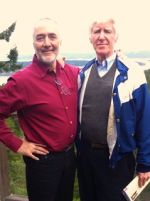 ker.
ker.
While on the island, Lester had a chance to catch up over lunch with Raffi Cavoukian, the children’s troubadour who also heads the Centre for Child Honoring. Raffi founded the Centre because he believes that when we truly honor our children, we will automatically make the right decisions for their future, which means providing an overall healthy environment now and for the future.
From there, Lester headed back to the States with an exceptionally well attended presentation at the Seattle Town Hall and equally enthusiastic audiences at talks sponsored by the World Affairs Councils of Portland and San Francisco.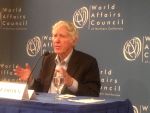
One more talk remains for this year’s book tour. It will be Thursday, December 12 at the Free Library of Philadelphia beginning at 7:30 PM.
If you haven't already done so, Breaking New Ground, is a great read and is a terrific gift idea. We are offering the $24.95 book for $15.00. If you get your order in to us by December 20, you will have it in time for the holiday.
Cheers to all!
Reah Janise Kauffman
Friday, November 08, 2013
Lester Brown was the first in his family to graduate from elementary school. In his new memoir Breaking New Ground he reveals what inspired him—and the millions of those who have read his books—to become environmentally active. The excerpt below reveals that he was driven from the very start.
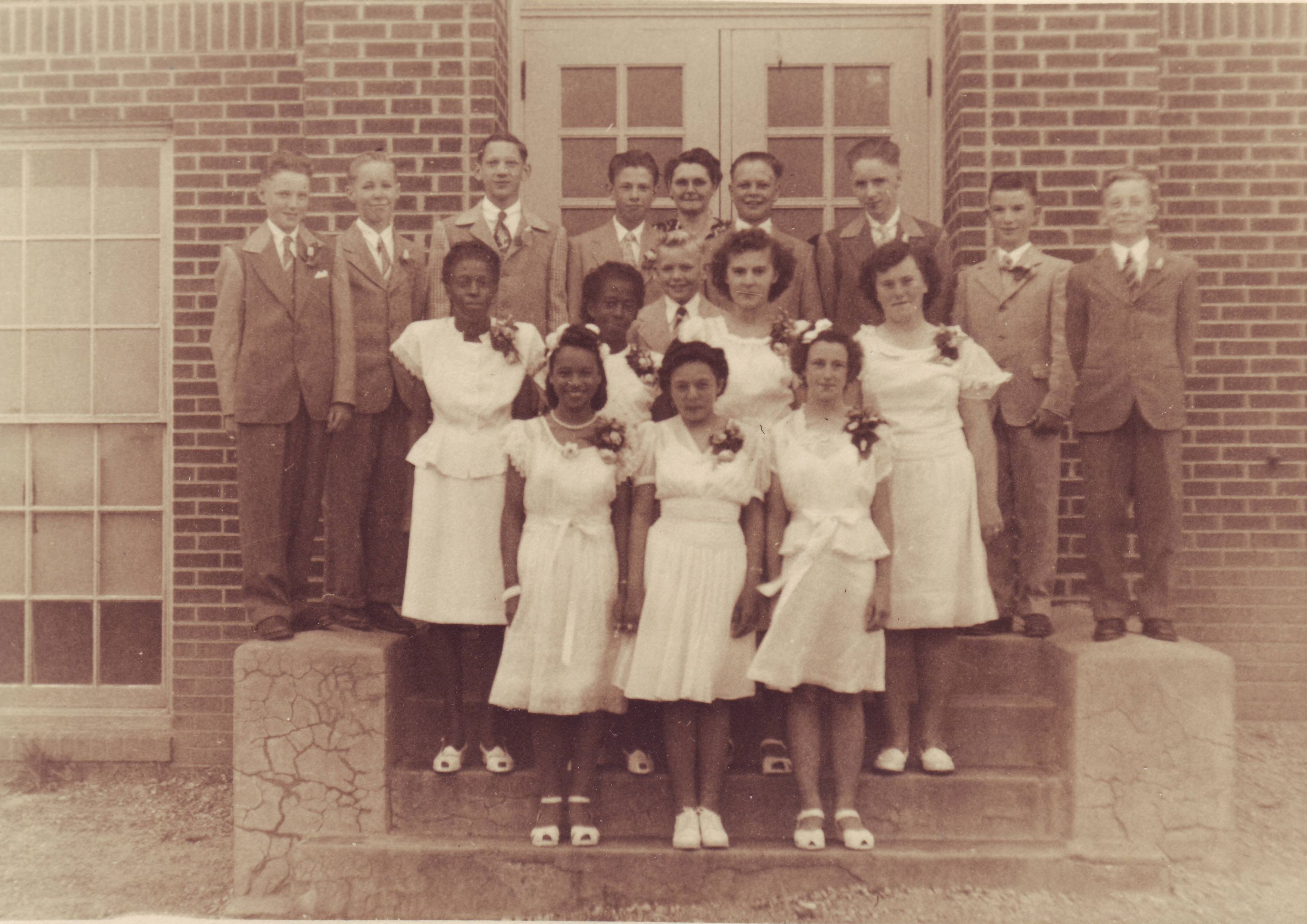 |
| Stow Creek Elementary School graduates. |
“Meanwhile I was enjoying school and reading voraciously. Once class assignments were given, I would rush to finish them so I could read books in the library. This was widely recognized by my teachers come report card time. My fourth-grade teacher, Mrs. Tomlinson, wrote, “His reading and choice of reading material, especially historical books, is outstanding. … The thing he needs to do most is to slow up.” The sixth-grade teacher, Mrs. Van Vliet, wrote, “He does his work ‘too fast.’ This leads to carelessness.” This was true, but I was willing to settle for a slightly lower grade because I was learning so much from reading.
During at least one school year, I read over 100 books. I found biographies intensely interesting, including those of our founding fathers. Others I particularly enjoyed were about Abraham Lincoln, Marie Curie, and George Washington Carver. By the time I graduated from eighth grade I had read almost every book in Stow Creek School.
Since we were rather isolated on the farm and since neither of my parents had ever read a book, our dinner table conversations were limited. Biographies opened the world to me in a way that my parents could not. Thus at an early age my sense of self was being influenced by my fascination with these political leaders and scientists. They had addressed the major issues of their time, and I wanted to do the same.”
For more on Lester’s early life check out the photo albums on our website and pick up a copy of Breaking New Ground today! Tomorrow Lester starts a West Coast Book Tour. He’ll be speaking in Vancouver, Salt Spring Island, Seattle, Portland, and San Francisco. For details, go to our Events page.
Best,
Julianne
Tuesday, October 22, 2013
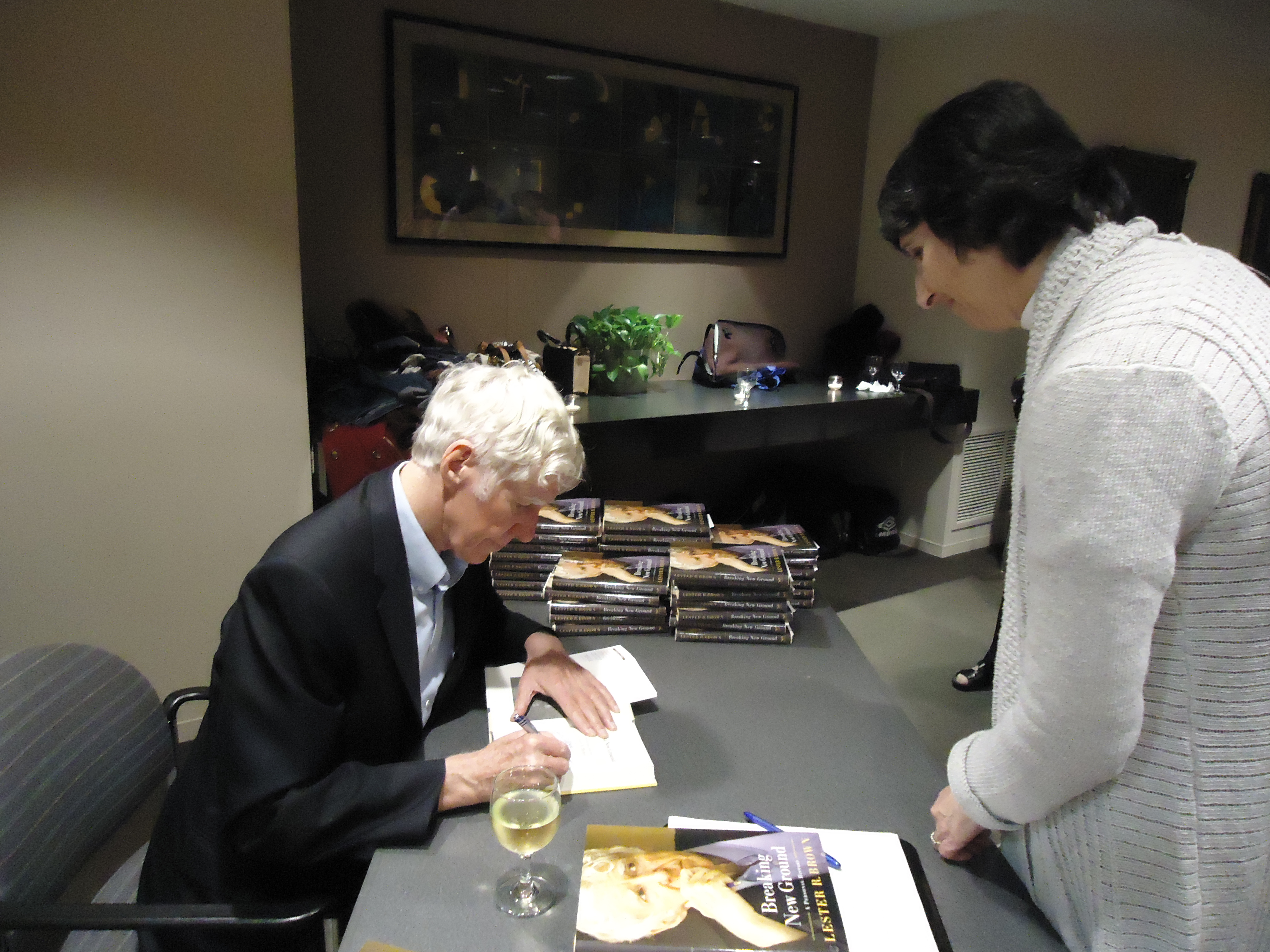 |
| Lester signing books at the party. |
Lester Brown’s memoir Breaking New Ground: A Personal History (W.W. Norton & Company) hit the bookshelves yesterday. Last Friday we held a book release party with family, friends, colleagues, and other environmental leaders. While we munched great food and drinks, Lester regaled us with stories about growing up on a farm in southern New Jersey and starting a tomato business with his brother Carl. He also answered questions about his time in India and what the future might hold.
It was a great night to celebrate and reflect on Lester’s remarkable life and career as an environmental leader.
In Breaking New Ground Lester recounts his life story as a founder of the global environmental movement. He recognized the process of globalization well before the term existed and helped define sustainable development. In his book, he reveals what inspired him—and the millions who have read his books—to become environmentally active.
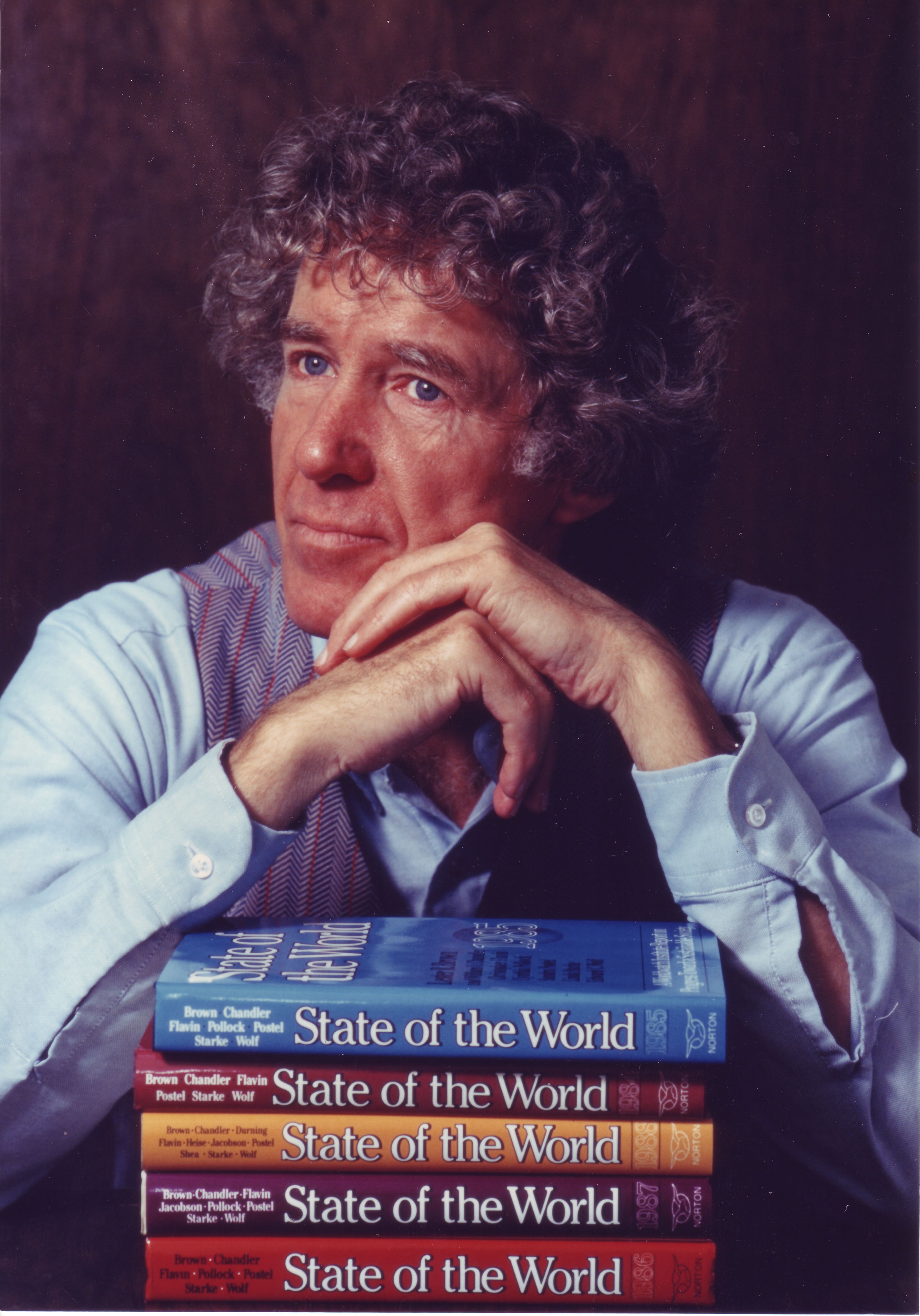 |
| Lester with copies of State of the World. |
While on a brief assignment for the USDA in India in 1965, he pieced together the early clues of an impending famine. His urgent warning to the U.S. and Indian governments set in motion the largest food rescue effort in history, saving millions of lives. This near miss by India led it to adopt new agricultural policies that he helped to shape.
Lester went on to advise governments internationally and to found the Worldwatch and Earth Policy institutes, two major non-profit environmental research organizations. Through these organizations and his writings, including 51 books published in 42 languages, Lester has helped us understand the interconnections among such issues as overpopulation, water shortages, and climate change, and their effect on food security. His 1995 book Who Will Feed China? led to a broad restructuring of China’s agricultural policy.
Never one to focus only on the problem, he always proposes pragmatic solutions to stave off the unfolding ecological crises that endanger our future. At the Earth Policy Institute, Lester has been offering responses to the major environmental challenges facing us today.
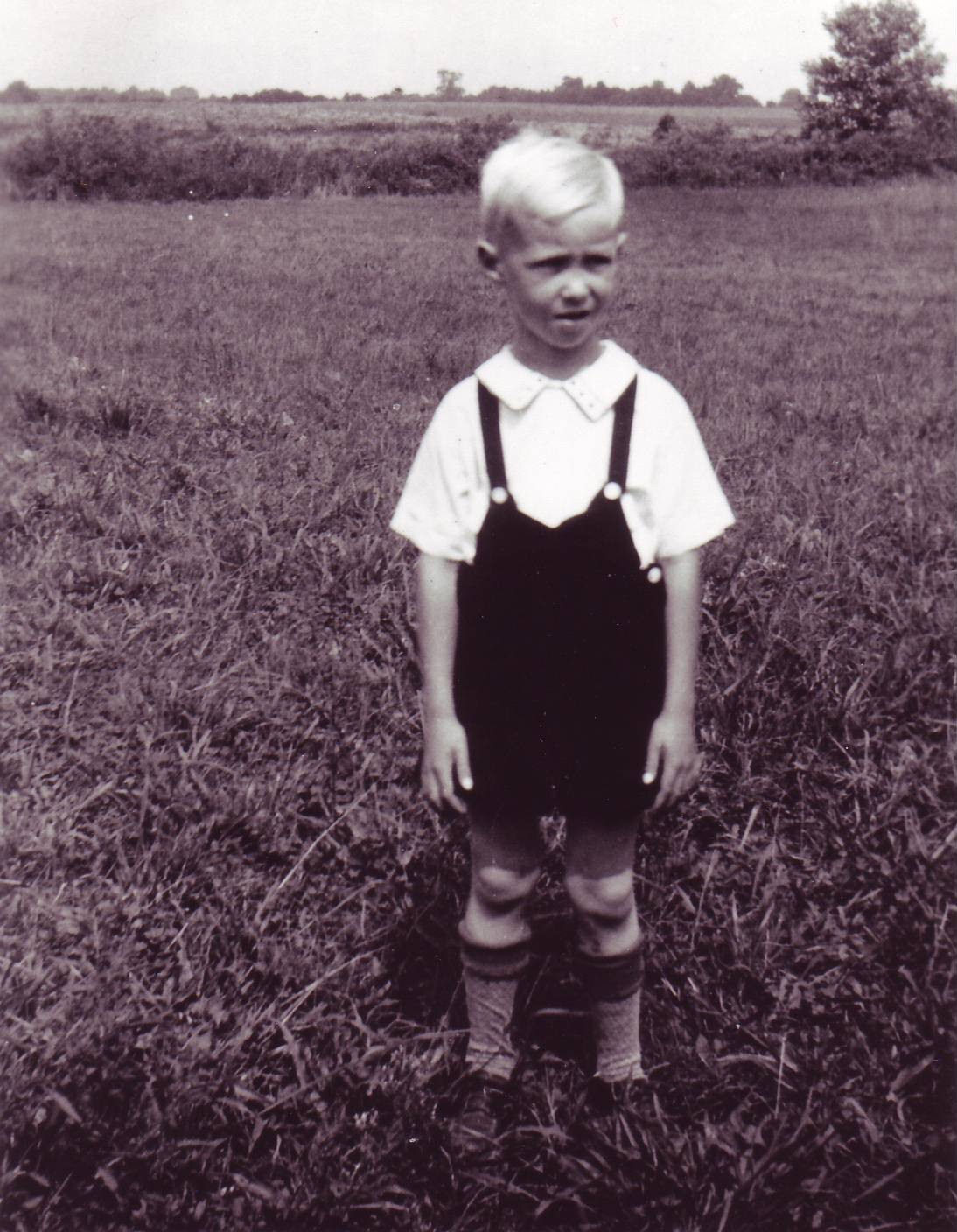 |
| Lester on the family farm at age 5. |
From a poor, but ambitious young man to a scholar and leader, Lester Brown inspires people to get to know the world around them. Breaking New Ground is all the more engaging because of his drive to make the world a better place.
"This is the life story of a true American hero . . . as a scientist and public intellectual dedicated to the cause of sustainability Lester Brown is in a class by himself." —David W. Orr, Paul Sears Distinguished Professor, Oberlin College.
Buy your copy today! And, check out photo albums, videos, kudos, and Chapter 1 up now on our website.
Best,
Julianne
Wednesday, October 02, 2013
It is always terrific to learn about how someone is promoting Plan B. Well, today we received the best news ever. Rather than summarize it, I am reprinting the email in its entirety.
|
Dear Lester,
We recall perfectly well that during one of your visits to the Netherlands you mentioned that for every nation in the world it takes vision and courage to take the necessary steps to contribute to the directions you carried out in your praise for Plan B. ….. and we did! We are pleased to share with you that in our country the Netherlands more than 40 organizations (employer and employee organizations, financial institutions, NGO and our Government) reached an agreement on a ‘Dutch Energy Agreement for Sustainable Growth’ to mobilize our nation to implement concrete actions in terms of energy savings, CO2 reduction, scaling renewable energy and mobility & transportation in 2020.
Your limitless efforts to share with the world your deep intrinsic belief that we need to act now, inspired many of us to transform it in The Netherlands into reality. Ad van den Ouweland |
Yes, it can be done. Governments and corporations can work together for the people and the earth.
Cheers,
Reah Janise Kauffman
Thursday, September 05, 2013
Shh! We’re going to let you in on a secret.
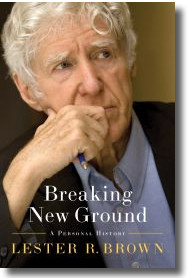 Lester Brown's autobiography, Breaking New Ground: A Personal History, has just come off the press and we are releasing it before it gets into bookstores on October 21.
Lester Brown's autobiography, Breaking New Ground: A Personal History, has just come off the press and we are releasing it before it gets into bookstores on October 21.
If you pre-order a copy from us today … we’ll even make sure Lester autographs it for you!
In Breaking New Ground, Lester reveals his modest beginnings, how he was the first in his family to graduate from elementary school, and what inspired him to shift from growing tomatoes to working on the world’s environmental issues. For decades, Lester has been inspiring people to get to know the world around them and to become environmentally active.
“I was born at home in a small house for hired hands nine miles west of Bridgeton, New Jersey, on March 28, 1934. During the early years, when we were sharecropping, our home had no electricity, no running water or indoor plumbing, and no refrigerator. Mom cooked on a woodstove. She washed our clothes on a washboard in a metal tub in which we took our baths once a week. By age five I was doing daily chores, including cleaning out the horse stables.” —Lester R. Brown
Interested in a sneak peek? Check out Chapter 1. Breakthrough, on our website.
Early comments on Breaking New Ground:
“This is a much-needed testament and historical document from one of the great environmentalists of our time.” —Edward O. Wilson, University Research Professor, Harvard University
“Lester continues to inspire us with his brilliant thoughts and ideas, and in his memoir, he isn’t afraid to also show us his heart.” —Ted Turner
“Lester Brown is one of humanity’s great eco-warriors, constantly updating the state of the planet while ceaselessly seeking solutions and a path to sustainability. Breaking New Ground is an inspirational story of what one person is capable of achieving.” —David Suzuki
“This wonderfully engaging read tells [Brown’s] story, from humble beginnings to transcendent figure on the world stage. Need some inspiration? Get yourself a copy of this book.” —Geoffrey Holland, Author, The Hydrogen Age
"What an amazing journey. . . . A must read for all those who care about the future of our planet." —Marilyn and Hal Weiner, Executive Producers, Journey to Planet Earth
Click here to order your autographed copy.
Cheers,
Reah Janise Kauffman
Tuesday, August 13, 2013
While summer is a time tending to be a bit more leisurely, it has been the opposite for the Institute. First, we received copies of the Swedish edition of Full Planet, Empty Plates. Thanks to Doris and Lars Almstrom for their tireless efforts!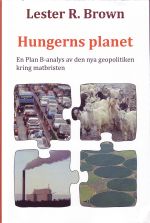
On June 24, Lester headed to England where he gave a talk at Oxford hosted by the School of Geography and the Environment. The next day he was in London to give a keynote address at the Agriculture Investment Summit and also did a Q&A on his book, Full Planet, Empty Plates.
While in London, he met with a few reporters, including John Vidal, the environment editor for the Guardian/Observer. They talked about food security and water shortages. Lester had been working on an article about water scarcity, a copy of which he gave to John. Not only did John write two articles based on their conversation, but he posted Lester’s article on the Observer’s website during our Fourth of July holiday. It was entitled "The Real Threat to our Future is Peak Water."
On returning to the office Monday, July 8, we fielded a number of media interviews and found an Internet abuzz with the news. We quickly posted the article on our website under the title “Peak Water: What Happens When the Wells Go Dry?” and sent it out on our listserv. The Guardian/Observer has been called the world’s most read small paper and it certainly deserves it. Its coverage of environmental issues is superb!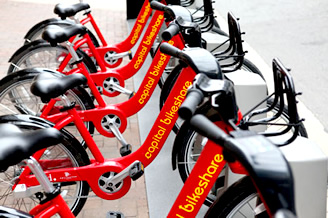
Meanwhile, Janet Larsen was making news with her two Updates on bicycle sharing. She compiled an extensive database of bike-sharing programs throughout the world, a collection that has been used by cities exploring setting up their own programs. But it was the Update she co-authored with Matt Roney on farmed fish overtaking beef production that really attracted attention. Between she and Matt, they gave interviews for two Canadian Broadcasting television stations, New Scientist, CTV (China), Radio New Zealand, and Australia Broadcasting, Bloomberg, and The Economist. Plus there were dozens of stories in the media.
And when the news about the first lab-grown hamburger hit, NPR called for our take on it. Janet weighed in for The Salt.
Meanwhile Lester gave two talks in the DC area: one to the Cedar Lane Unitarian Church and the other at the joint annual meeting of the Agricultural & Applied Economics Association and the Canadian Agricultural Economics Society.
We also hosted a day of filmed interviews for a documentary by Marilyn and Hal Weiner, the producers who did the Plan B documentary that haas bee aired on PBS and in screenings around the world. Their new film is entitled Extreme Realities and explores the links between climate change, extreme weather, and threats to our nation's security. This will be a new episode in the PBS prime-time environmental series, Journey to Planet Earth.
But, don’t be lulled into thinking that’s all that we’ve been doing. We have a big announcement coming that we think you will all enjoy.
Cheers,
Reah Janise Kauffman
Monday, June 03, 2013
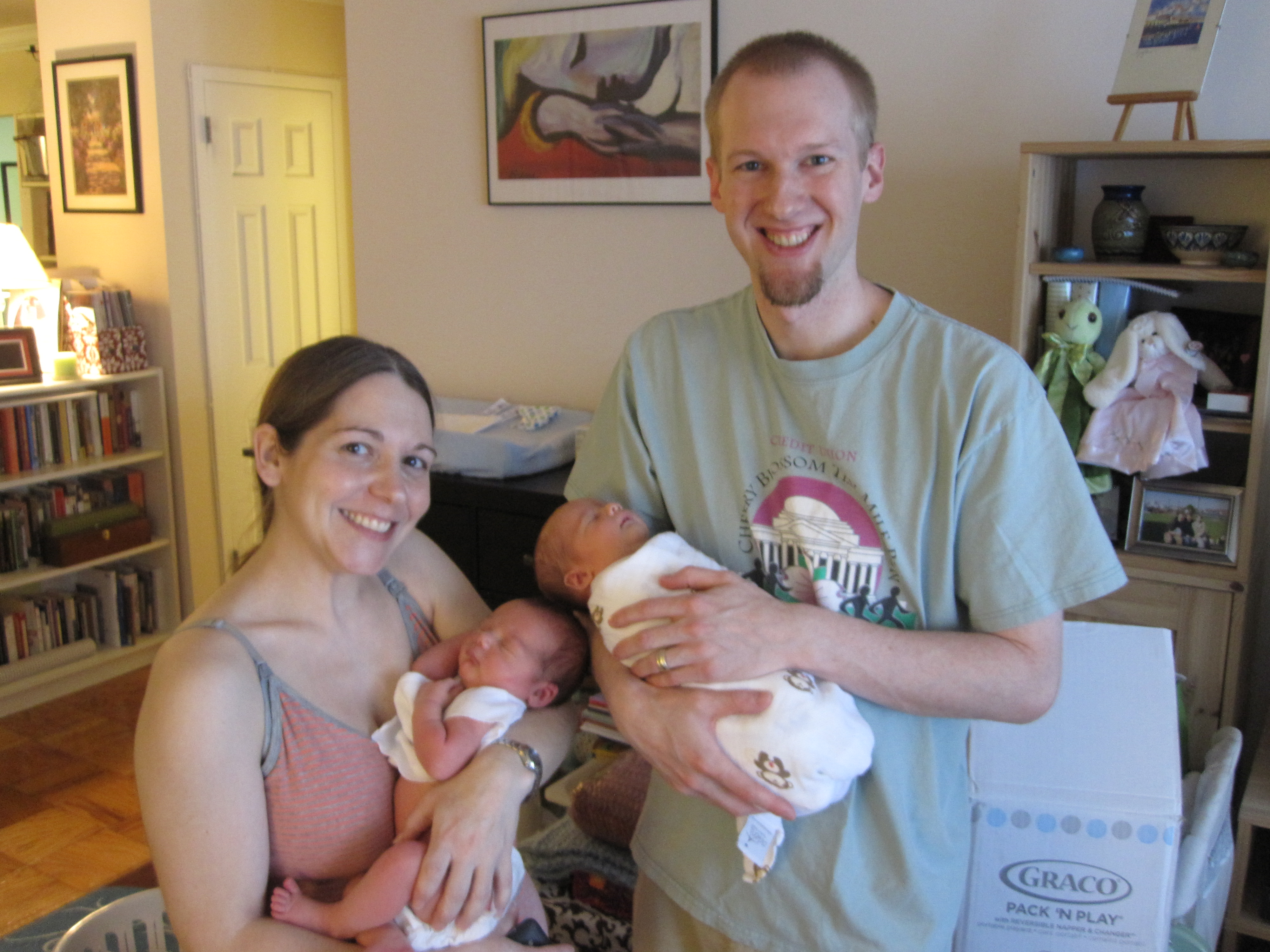
On Wednesday May 22 the EPI team grew by two. Our Research Associate Matt Roney and his wife Sarah welcomed twins into the world. Born two minutes apart at 8:32 and  8:34 am, Calvin Alexander, 7 pounds 5 ounces, and Abigail Helen, 6 pounds 12 ounces, are both healthy and happy. It remains to be seen if Calvin will take on the roles of being a big brother.
8:34 am, Calvin Alexander, 7 pounds 5 ounces, and Abigail Helen, 6 pounds 12 ounces, are both healthy and happy. It remains to be seen if Calvin will take on the roles of being a big brother.
Congratulations to the happy family!
Sincerely,
Julianne
Monday, May 20, 2013
Where ha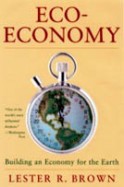 s the time gone? It seems like only a few weeks ago we were moving into our office space. The carpeting had not arrived and the floors were more than dusty. Only some furniture had arrived, mostly in Lester’s office, so the rest of us were using rented chairs and folding tables. The computers and phones, though, were set up and we were ready for action.
s the time gone? It seems like only a few weeks ago we were moving into our office space. The carpeting had not arrived and the floors were more than dusty. Only some furniture had arrived, mostly in Lester’s office, so the rest of us were using rented chairs and folding tables. The computers and phones, though, were set up and we were ready for action.
During our first month, we held three press conferences: one to launch the Institute, the next about the dust bowl challenging China, and the third on how President Bush’s energy plan totally neglected wind power.
That year we were off the blocks in alerting the world to issues that have mostly gotten worse: China’s worsening water shortages, rising sea level, the drop in the world grain harvest, and climate change.
We also published Eco-Economy: Building an Economy for the Earth by Lester Brown, in which he said that we needed to shift our focus from thinking the environment is a subset of the economy to realizing that the e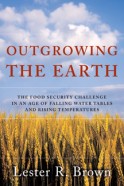 conomy is a subset of the environment. As he astutely noted that if the economy is not compatible with the earth’s ecosystem both will suffer (and they are certainly incompatible right now).
conomy is a subset of the environment. As he astutely noted that if the economy is not compatible with the earth’s ecosystem both will suffer (and they are certainly incompatible right now).
The larger the economy becomes relative to the ecosystem, and the more it presses against the earth’s natural limits, the more destructive this incompatibility will be.
An environmentally sustainable economy—an eco-economy—requires that the principles of ecology establish the framework for the formulation of economic policy and that economists and ecologists work together to fashion the new economy. (from Eco-Economy)
Eight books have followed Eco-Economy. The Plan B series was designed to keep front and center an overarching plan that could be quickly implemented should world leaders have the political will to do something. Our most recent book is Full Planet, Empty Plates, and another is in the works (more about that in a later blog). And our books are not confined to English; they have been publi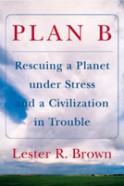 shed in some 33 languages, including Esperanto!
shed in some 33 languages, including Esperanto!
Over the years, we have broadened the types of publications we do. Our newest are Data Highlights, such as a recent one by Emily Adams, “The Energy Game is Rigged: Fossil Fuel Subsidies Topped $620 Billion in 2011.”
Our original Plan B Updates provide fresh analyses such as Matt Roney’s on how overfishing threatens a critical link in the food chain. And Lester Brown’s Update on the world food situation.
Althoug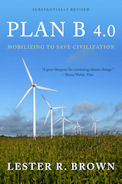 h we’ve seen a lot of discouraging action and inaction by governments and corporations, we’ve also seen a lot of encouraging and inspiring things taking shape, as evidenced in Janet Larsen’s two Updates on bike-sharing programs around the world.
h we’ve seen a lot of discouraging action and inaction by governments and corporations, we’ve also seen a lot of encouraging and inspiring things taking shape, as evidenced in Janet Larsen’s two Updates on bike-sharing programs around the world.
While the majority of our material is in text or graphics, we also have terrific visuals. Just take a look at our Data Center. Looking for legitimate data? Check it out.
There is also a film by award-winning documentary producers Marilyn and Hal Weiner of Screenscope. Plan B has aired a number of times on national public television and is also available for purchase.
We’ve also posted a number of other videos on our website, including a synopsis of Full Planet, Empty Plates.
And, fo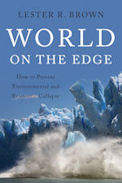 r you who like to listen while you drive, run, etc., we have podcasts of all of our reports.
r you who like to listen while you drive, run, etc., we have podcasts of all of our reports.
Our intrepid researchers have also put together amazing slide shows summarizing the wealth of information in our books, such as for Full Planet, Empty Plates and World on the Edge, which are sometimes also translated into other languages.
As a small research organization, our goal is to provide the information that others will use to effect positive change. We have been seeing that happen and have collected a number of examples of what people have been inspired to do. For instance, after reading one of our books, people have changed careers, working to promote a sustainable future. Others have started organizations and movements to push for Plan B in their countries and cities. They have distributed books to policymakers and started reading groups. They have used our publications in the classroom, in lectures, and in churches. Our books have been used as the book in common at universities. They have even inspired songwriters and investment bankers.
Accomplishments outside of honorary degrees, awards, and publications? Well, after decades of running, Lester finally achieved national ranking as a ten-miler, placing third in the seventy-five to seventy-nine age gr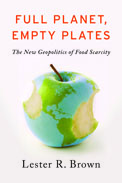 oup. He’s planning on ranking at least as high in the eighty and up category at next year’s Ten-Mile Cherry Blossom Race. Janet and her husband are preparing to celebrate the second birthday of their beautiful daughter, Mandolyn. Matt and his wife Sarah are getting ready to double their fun with twins. Reah Janise keeps knitting, mainly her own designs, and helps her husband with their community garden. (Already munching on lettuce!) Millicent and her sisters like to travel, recently taking their mother to Las Vegas to celebrate her birthday. They say they did everything but gamble! Julianne is preparing to start an evening master’s program in communications at Georgetown, while Emily and her husband Steve are off sampling Parisian cuisine.
oup. He’s planning on ranking at least as high in the eighty and up category at next year’s Ten-Mile Cherry Blossom Race. Janet and her husband are preparing to celebrate the second birthday of their beautiful daughter, Mandolyn. Matt and his wife Sarah are getting ready to double their fun with twins. Reah Janise keeps knitting, mainly her own designs, and helps her husband with their community garden. (Already munching on lettuce!) Millicent and her sisters like to travel, recently taking their mother to Las Vegas to celebrate her birthday. They say they did everything but gamble! Julianne is preparing to start an evening master’s program in communications at Georgetown, while Emily and her husband Steve are off sampling Parisian cuisine.
It’s been a great twelve years so far, especially since we are working to provide a plan to save civilization. Isn’t that what we all want?
Cheers,
Reah Janise Kauffman
Wednesday, May 01, 2013
The Institute’s most intrepid researcher, Lester Brown, has been quietly making a splash speaking at select events in the DC area over the past few months on the findings in his recent book, Full Planet, Empty Plates.
In December, he spoke at a Chesapeake Climate Action Network conference in Baltimore that was focused on the problem of fracking. 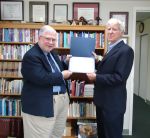
He also received the Planet and Humanity Medal from the International Geographical Union presented by Ron Abler. The medal is for his “early, incisive, and tireless advocacy of measures to promote public and policy maker awareness of global ecological issues via trenchant publications and public presentations.”
In January, Ira Flatow, host of NPR’s Science Friday, interviewed Lester on Full Planet, Empty Plates, getting to the heart of Lester’s history with this issue. January also saw Lester speaking at the Women’s National Democratic Club on the new geopolitics of food scarcity and the National Geospatial Intelligence Agency. He took time out to trip the “light fantastic” at the Green Inaugural Ball (even though he never made it to the dance floor!) 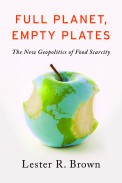
In April, he gave two luncheon addresses, the first for the National Food Policy conference hosted by the Consumer Federation of America. “It was the perfect luncheon address – thought provoking, entertaining and tied into a number of our other panel discussions throughout the day. Multiple attendees came up to me over the course of the two days to say how impressed they were with his speech,” said Chris Waldrop, Director of The Food Policy Institute.
The second address was for the agricultural committee of the Organization of Women in International Trade . He talked about how the world is now in transition from an era of food abundance and surpluses to an era of chronic scarcity. As food prices climb, the worldwide competition for control of land and water resources is intensifying. “In this new world,” he said, “access to food is replacing access to oil as an overriding concern of governments. Food is the new oil, land is the new gold.”
Chapter 1 of Full Planet, Empty Plates is now available on our website and over the next several weeks we will be releasing the rest of the book in installments. Look for a new chapter about every other week and sign up for our email list to receive them directly. Supporting data, video, and slideshows are also available for free download and check our Events page for Lester's future speaking engagements.
Best,
Julianne


